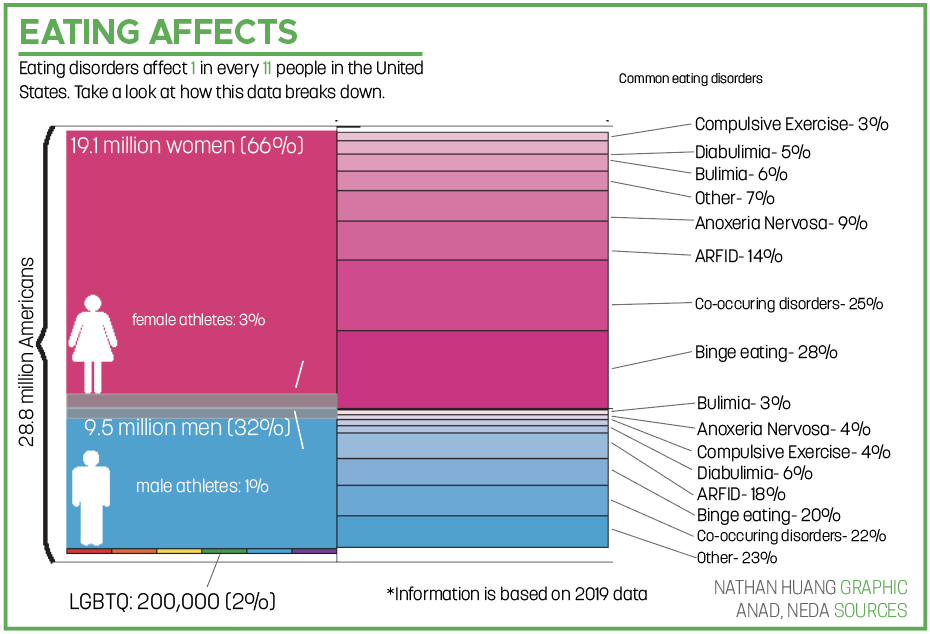Lily Rose, varsity women’s track and field team member and junior, has only had one experience in which someone approached her about her weight.
Rose said, “I’m a very skinny person and as a runner, that’s just natural. My body has grown into being a runner’s body. I had a coach one time, a female coach, come up to me and say, ‘Hey Lily, I’ve noticed that you’ve gotten a lot smaller since last year and I’m just concerned, making sure that you’re eating and everything.’”
However, while Rose said that experience was only an isolated occurrence, people’s expectations of body image have hit close to home for athletes like Evie Taller, women’s cross-country and track team member and junior, who said she has seen firsthand the pressure —and the body confidence issues that result—for athletes like her feel to look a certain way.
“We (athletes are) kind of expected to be more sort of thin,” she said.
Those expectations for female athletes have led to some making harmful decisions in order to lose weight and be thinner, sometimes culminating in the development of an eating disorder. According to recent interviews of Division I athletes conducted by Women’s Health, almost 15% of those interviewed stated they have had an eating disorder. That number reached as high as 32% with rowers. Additionally, 35% of respondents said they believed at least one of their teammates has an eating disorder.
For her part, Rose said she has noticed some athletes on the cross-country team dealing with issues with body image and not wanting to show their own body.
“Something that I noticed is that, during the summer for cross-country, we have the option to run without a shirt and just have our sports bra. There are some days where if it’s really hot, it’s almost like ‘why would you not take off your shirt?’ I don’t really judge anyone upon it,” Rose said. “I feel as though the atmosphere from middle school to high school is quite different in that we are mature adults and we’re not going to be ‘objectified’ by taking off our shirts. I see a little bit in some freshmen, typically towards the beginning of our season in the summer, where they’re really hesitant to take off their shirts or they do only on certain days.”
According to Melanie Pulley, swim coach for Carmel Swim Club and Carmel High School, some of those issues come from female athletes unfairly comparing themselves to other athletes.
“I think they see people who are professional athletes or someone who is more elite than they are and they feel there’s a necessity to compare themselves to that athlete. And it’s a whole thing working on self confidence,” Pulley said.
Rose said, rather than perpetuate an unrealistic idea of what a “healthy” woman looks like, social media has actually shown girls a variety of different body types.
“I have seen a lot on social media recently that has represented a lot of different body types and I appreciate that,” she said. “I think that allows for so many of our younger girls to be like, ‘I can tailor my body to the way that it is.’ Being healthy looks different for everybody and of course, you know what’s healthy for you and what isn’t. I think social media has allowed us to see that healthy can look different ways.”
Rose added that the cross-country team has developed a supportive culture to help any girls who may be struggling with body image issues.
“I would probably say that everyone around you is there to support you,” she said. “If you see the amount that we cheer for (other runners) on their times and how they do with a sport, that is just as much how we support them in everyday life issues. We love to call our team a family because we spend so much time together that I am proud to call all of those girls my sisters.”

“I spend so much time with (my teammates) that to feel self-conscious in my mind, although natural, is almost silly,” she added, “because there is absolutely no way that I can imagine anybody looking at another girl on our team and saying ‘Wow, she looks that way? Why?’ It’s just not part of our culture on our cross-country team. It’s something that does not happen.”
Ultimately, Taller said she has some words of wisdom for any of her teammates who feel like they do not look as they should.
“You don’t need to worry about what other people think of you,” she said. “Don’t worry about what you look like—let how you (perform) speak for itself.”
*Additional reporting done by Austin Guo


































![AI in films like "The Brutalist" is convenient, but shouldn’t take priority [opinion]](https://hilite.org/wp-content/uploads/2025/02/catherine-cover-1200x471.jpg)









































![Review: “The Immortal Soul Salvage Yard:” A criminally underrated poetry collection [MUSE]](https://hilite.org/wp-content/uploads/2025/03/71cju6TvqmL._AC_UF10001000_QL80_.jpg)
![Review: "Dog Man" is Unapologetically Chaotic [MUSE]](https://hilite.org/wp-content/uploads/2025/03/dogman-1200x700.jpg)
![Review: "Ne Zha 2": The WeChat family reunion I didn’t know I needed [MUSE]](https://hilite.org/wp-content/uploads/2025/03/unnamed-4.png)
![Review in Print: Maripaz Villar brings a delightfully unique style to the world of WEBTOON [MUSE]](https://hilite.org/wp-content/uploads/2023/12/maripazcover-1200x960.jpg)
![Review: “The Sword of Kaigen” is a masterpiece [MUSE]](https://hilite.org/wp-content/uploads/2023/11/Screenshot-2023-11-26-201051.png)
![Review: Gateron Oil Kings, great linear switches, okay price [MUSE]](https://hilite.org/wp-content/uploads/2023/11/Screenshot-2023-11-26-200553.png)
![Review: “A Haunting in Venice” is a significant improvement from other Agatha Christie adaptations [MUSE]](https://hilite.org/wp-content/uploads/2023/11/e7ee2938a6d422669771bce6d8088521.jpg)
![Review: A Thanksgiving story from elementary school, still just as interesting [MUSE]](https://hilite.org/wp-content/uploads/2023/11/Screenshot-2023-11-26-195514-987x1200.png)
![Review: "When I Fly Towards You", cute, uplifting youth drama [MUSE]](https://hilite.org/wp-content/uploads/2023/09/When-I-Fly-Towards-You-Chinese-drama.png)
![Postcards from Muse: Hawaii Travel Diary [MUSE]](https://hilite.org/wp-content/uploads/2023/09/My-project-1-1200x1200.jpg)
![Review: "Ladybug & Cat Noir: The Movie," departure from original show [MUSE]](https://hilite.org/wp-content/uploads/2023/09/Ladybug__Cat_Noir_-_The_Movie_poster.jpg)
![Review in Print: "Hidden Love" is the cute, uplifting drama everyone needs [MUSE]](https://hilite.org/wp-content/uploads/2023/09/hiddenlovecover-e1693597208225-1030x1200.png)
![Review in Print: "Heartstopper" is the heartwarming queer romance we all need [MUSE]](https://hilite.org/wp-content/uploads/2023/08/museheartstoppercover-1200x654.png)





Katie • Mar 18, 2021 at 8:24 am
Thanks for this encouraging article! Thanks!